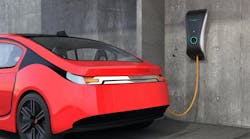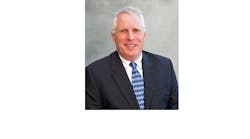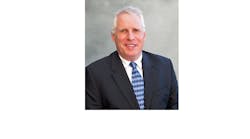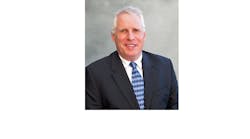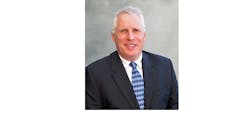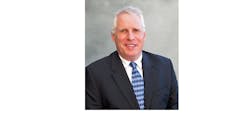M&As, concerns about electronic commerce and a solid economy colored the electrical scene during the past year.
There was no lack of news and trends for Electrical Wholesaling's editors to cover during the past year. Distributor mergers and acquisitions spiked to what very well may be a new high; the industry's progress in e-business frustrated even the most devoted proponents of electronic commerce; and a still-vigorous economy that seemed almost too good to be true over the past decade finally showed some signs of slowing down. Here is a look at these and other trends impacting the electrical wholesaling industry in 2000:
The U.S. economy fuels yet another solid year in the electrical construction market. Companies in the electrical industry have had billions of dollars of business wash over them during one of the U.S. economy's longest hot streaks ever. Although this growth will slow some next year, few economists expect the current flood of business to ebb dramatically any time soon because inflation and unemployment are in check, oil prices are expected to retreat to manageable levels and consumer confidence remains high.
Consumers vote with their wallets. When they are feeling good about the future, they spend their hard-earned cash on anything from new homes, automobiles and durable goods like washing machines and refrigerators to more discretionary items, like vacations and new wardrobes. That's good news in 2001 for the electrical construction market, where economic fortunes are tied to the building and maintenance of the infrastructure that produces these goods. Barring any unforeseen international calamity, the stage appears to be set for another solid business year in 2001.
The Y2K bug never bites, but e-business blues burst the blue-sky bubble. When the clock struck 12 last New Year's Eve, Y2K gremlins didn't send the computerized world back to the Stone Age. That was good news for everyone except the software consultants who had planned to retire early after rebooting the world.
A more perplexing story on the computer front is the very slow and painful application of e-business to real-world applications and customer needs. With many of the business models dot-coms rely on, the biggest problem is they don't take into account customer demand. Many bank on their ability to slash transaction costs and cut inefficiencies in the supply chain. While these are noble causes, not enough potential customers are so dissatisfied with their current business practices that they are willing to invest in e-business. Notable exceptions are Fortune 500 customers with multiple facilities; they are much more likely to demand the types of operating efficiencies of their suppliers that e-business can produce.
Although e-business will eventually play a significant role in the distribution business, it's not going to be the total paperless solution that its strongest proponents expect it to be - there will always be some companies making a nice living doing business more traditionally. A lot of the attention is on online purchasing, but many industry consultants agree it will take years for online purchasing to carry 20% of the orders for all electrical products sold, if it ever reaches that figure.
Down the road, 2001 may be remembered as the year e-business returned to earth. Many dot-coms with sketchy business plans, no profits and astronomical cash-burn rates began to pull the plug on their operations by mid-year; expect more to go down in the next 12 months.
Even the technological leaders in the e-business world are experiencing some growing pains. W.W. Grainger Inc., Skokie, Ill., expects to do more than $300 million in sales over its various Web sites in 2000, but the company is still tinkering with its Internet approach to find the right online profile. In June 2000, the company blended its OrderZone.com portal with Works.com, Austin, Texas, to provide online shoppers with a single source of commercial/industrial MRO items and office supplies.
On the manufacturing side, even companies that invested millions in their online efforts and seemed to be light years ahead of some competitors in e-business were unable to get their investments to produce bottom-line results. For instance, Thomas & Betts Corp., Memphis, Tenn., was widely regarded as one of the leading proponents of the use of electronic commerce in the electrical wholesaling industry. But with its stock price in the doldrums and the troubles that its state-of-the-art distribution and logistics network was having delivering on-time, the company has had to rethink its e-commerce and technology approach. In August, T&B announced a major restructuring. The changes were significant: Two T&B executives who led many online efforts for the company and for the electrical industry as a whole, Clyde Moore, formerly chairman and CEO; and John Haluska, formerly chief information officer, left the company as part of the restructuring.
Hagemeyer brings a new international flavor to the acquisition game. What a difference a year makes. In about 13 months, Hagemeyer N.V., Naarden, Netherlands, went from a company largely unknown in the U.S. electrical wholesaling industry to a large regional player with 98 locations in the Middle Atlantic and Southeast regions of the United States and more than $450 million in electrical product sales. The company built this network through its acquisitions of Tristate Electrical and Electronics Supply Co. Inc, Hagerstown, Md., in November 1999, and its acquisition this year of Cameron and Barkley Co., Charleston, S.C. The CamBar acquisition gave Hagemeyer immediate access to Cameron and Barkley's integrated-supply contracts, which account for a big piece of the company's total business. Over the past year, CamBar has been an active acquirer itself, buying the electrical business of McJunkin Corp., Charleston, W. Va., and 18 locations of Fairmont Supply Co., Washington, Pa. Both companies are active in the integrated supply market. Hagemeyer, which has U.S. operations based in Atlanta, also acquired one of the largest U.S. safety-products distributors with its 1999 acquisition of Vallen Corp., Houston.
Hagemeyer has been busy in other parts of the world, too. This year the company bought Australia's The Electrical Group (TEG), Melbourne, which has $465 million in electrical sales and a 29% market share; and WF Electrical PLC, which has $285.4 million in sales and is the fifth largest distributor in Great Britain. Hagemeyer, which has $7 billion in sales, 17,000 employees and offices in 60 countries, also owns the Newey and Eyre Group, one of the largest distributors in Great Britain. The company is also a distributor of automotive, health, consumer appliances and electronics supplies.
Westburne on fire with key acquisitions. It doesn't seem that long ago when Buffalo, N.Y.'s Wehle Electric Supply was the only U.S. electrical company part of Westburne's North American holdings. But as part of its effort to grow past its electrical and plumbing interests in Canada, Westburne Inc., St. Laurent, Quebec, reached across the border to acquire several well-known U.S. electrical distributors. In 2000, the company announced plans to acquire Denver's Ryall Electric Supply Co.; ANESCO, Kingston, Pa.; SPT Electric Supply Co. Inc., Belle Mead, N.J.; and United Electric Supply Co., St. Louis.
Westburne's earlier large U.S. acquisitions are Blazer Electric Supply, Colorado Springs, Colo.; Colotex Electric Supply Co., Loveland, Colo.; Electrical Suppliers Inc., Norfolk, Va.; and three Ohio branches of All-Phase Electric Supply Co., Benton Harbor, Mich.
Westburne, its $300-plus million in electrical sales, and its flurry of U.S. acquisitions became part of the Rexel NA network this year through an acquisition when Rexel, the largest electrical distributor in the world, made yet another major strike into the North American market.
Rexel ramps up North American presence. An independent manufacturers' rep told me a long time ago that Paris-based Rexel (then known as CDME) wanted to become one of the largest electrical distributors in the United States. At the time, it seemed like wild speculation because the company had not yet made its purchases of Southern Electric Supply Co., Meridian, Miss.; Consolidated Electric Supply Inc., Miami, Fla.; or Summers Group, Dallas. After completing these acquisitions during the 1990s, the company was well on its way to fulfilling that rep's prophesy.
Rexel's acquisitions this year carry the company a few steps closer to this goal. With its purchases of Branch Electric Supply Co., Upper Marlboro, Md.; Mader Electric Inc., Sarasota, Fla.; Maverick Electric Supply Inc., Dallas; Morristown Electric Wholesale Co., Morristown, Tenn.; and Westburne, Rexel has become a force in many if not most of the major U.S. markets.
Sonepar solidifies grasp on the Eastern Seaboard and moves into the Midwest. You can't talk too long about international distributors without mentioning Sonepar US, Berwyn, Pa. Although as of press time Sonepar US, owned by Sonepar SA of Paris, had not announced any acquisitions in the latter half of 2000, earlier in the year the company bought four companies on EW's Top 250 listing, as well as three smaller firms. In 2000, the company acquired Brook Electrical Distribution Co., Lincolnshire, Ill.; Capital Lighting and Supply, Alexandria, Va.; and Viking Electric Supply Inc., St. Paul, Minn. Sonepar subsidiaries purchased Dixie Electric Supply Corp., Richmond, Va.; Davis Electric Supply Inc., Clearwater, Fla.; West Philadelphia Electric Supply Co., Philadelphia; and Light Options Ltd., New York.
Other major distributor acquisitions in 2000 included the following: Consolidated Electrical Distributors Inc. (CED), Westlake Village, Calif., acquired Dauphin Associates Inc., Harrisburg, Pa.; Houston Wire and Cable, Houston, bought the Futronix wire and cable distribution business from Kent Electronics Corp., Houston; Graybar Electric Co., St. Louis, acquired Ireland Electric Supply, Augusta, Ga., and Splane Electric Supply Co., Bellville, Mich.; B&K Electric Wholesale, City of Industry, Calif., bought Sanger Associates Inc., Van Nuys, Calif.; and WESCO, Pittsburgh, bought KVA Supply, Denver, and Control Corp. of America, Richmond, Va.
Cooper Industries flexes it muscles. Houston-based Cooper Industries Inc. isn't a stranger to the M&A game. It has added to its portfolio of electrical companies many times over the years with strategic acquisitions. In 2000, the company made some its biggest acquisitions ever with its purchases of B-Line Systems, Highland, Ill., and Eagle Electric Manufacturing, Long Island City, N.Y. The company also acquired a British enclosure manufacturer, Willsher & Quick, Somerset, England.
Cooper Industries also announced it was pulling out of the Affiliated Distributors buying/marketing group and that it was launching the Cooper Connection distributor marketing program, so that its distributors could maximize their sales and marketing efforts of the Cooper family of electrical products, which includes Arrow-Hart and Eagle Electric wiring devices, B-Line, Bussmann, Crouse-Hinds and Cooper Lighting.
There was plenty of M&A action in other areas, too. The largest deals included the planned acquisition by General Electric Co., Fairfield, Conn., of Honeywell Inc., Morristown, N.J.; the purchase by Ideal Industries Inc., Sycamore, Ill., of the SureTest product line from Industrial Commercial Electronics Inc., Tonowanda, N.Y.; the deal where Lamson & Sessions, Cleveland, bought all the stock of Pyramid Industries Inc., Erie, Pa., a manufacturer of high-density polyethylene tubing; Danvers, Mass.-based Osram Sylvania's addition to its electronic ballast business with the acquisition of Motorola Lighting Inc., Lake Zurich, Ill.; Palatine, Ill.-based Square D Co.'s purchase of EFI Electronics, Salt Lake City; Louisville, Ky.-based Genlyte Thomas Group's acquisition of all of the assets of the U.S. Safety System division of the Chloride Power Electronics Inc., Burgaw, N.C.; the announcements by Tyco International Ltd., Bermuda, that the company had acquired the electronic OEM business unit of Thomas & Betts Corp., Memphis, and the Power Systems business unit of Lucent Technologies, which is based in Mesquite, Texas; and the purchase by Legrand, Paris (the parent of Pass & Seymour, Syracuse, N.Y.), of West Hartford, Conn.-based Wiremold Co., and Wiremold's acquisition of Homaco, Chicago, to add to its voice/data product offering.
A-B distributors band together. These are interesting times for Allen-Bradley distributors. The products and services they sell are moving from a base in industrial control to a broader package that includes more of the software that links these devices. The investment they must make in the high-tech and high-touch sales strategy their customers require was never insubstantial, but it has had to increase because of the addition of these new services.
Consolidation of the distribution channel is also a major factor. During the past year some Allen-Bradley/Rockwell Automation distributors banded together to share some of the marketing and MIS costs of their sales efforts while maintaining their companies' individual identities.
In January, Holmes Distributors Inc., Portland, Maine; Oakes Electric, Holyoke, Mass.; and RERO Distribution Cos. Inc., Rochester, N.Y., merged together to form Horizon Solutions to serve the needs of customers in Northeastern markets throughout New England and upstate New York.
The three distributors in the Horizon Group also joined forces with 15 other Allen-Bradley/Rockwell Automation distributors to form the Vanguard Group, where they will collaborate on certain e-business marketing efforts, such as building Web sites to sell automation products and exchange ideas on serving the industrial/OEM market.
